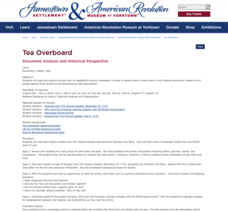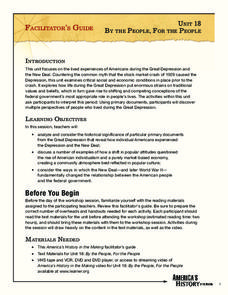Student Handouts
Letter from Birmingham Jail
Analyze an abridged version of Martin Luther King Jr's "Letter from Birmingham Jail." Class members read the excerpt and respond to four provided questions, which focus on the content provided. Consider taking the time to read the entire...
Curated OER
Sustained Resistance
Eleventh graders research events that led up to the Civil Rights movement using primary source documents that show attitudes about lynching.
Curated OER
Mastering the Document-Based Essay Question
Students use a primary source document from the Civil War period of history in order to derive meaning for an essay question. The essay is based completely on the document with no other research to support the content.
Curated OER
Individual Responsibility and Resistance During the Holocaust
Students examine what obstacles hinder resistance, what types of resistance are possible and how different individuals resisted Nazi oppression. They examine primary source documents related to the Holocaust and analyze various sources...
Center for Civic Education
The Equal Rights Amendment in the 1970s and Today
Discover the fascinating history of the Equal Rights Amendment and discuss the major implications and considerations associated with it today. Here you will find background information on the topic, a graphic organizer summarizing...
James Madison Memorial Fellowship Foundation
Those "Other Rights:" The Constitution and Slavery
Did the United States Constitution uphold the institution of slavery, or did it help to destroy it? Young historians study Article 4, Section 2, Clause 3 of the Constitution and evaluate the rights of slaveowners as they compared to or...
Jamestown-Yorktown Foundation
How Do We Know about Colonial Life?
Young history sleuths examine an inventory of the belongings of a Virginia colonist and use deductive reasoning to determine what the document reveals about colonial life. They then use a Venn diagram to compare the inventory with a...
Center for Civic Education
Women's History Month Word Clouds
What a great idea for celebrating Women's History Month and discovering the amazing efforts that individuals have put forth on behalf of women's rights! Learners take a closer look at the speeches and other primary source documents of...
National History Day
Why Did the United States Enter World War I in 1917?
World War I was the first major conflict on a global scale. Using primary documents, learners determine why the United States chose to enter World War I when it did. After analytical writing and group research, the causes of America's...
Rutgers University
How the Allies Won World War II: Island-hopping in the Central Pacific
Using primary source documents, young historians explore the strategies the US used to defeat Japan during WWII. They also learn about the American military experience, and innovations that changed the style of warfare. Young scholars...
Wells Fargo
Wells Fargo History Museum: Curriculum Guide
Learn about the California Gold Rush from an institution that has been in place since the early days of the American West: Wells Fargo History Museum. From domain-specific vocabulary review to group research projects, an expansive packet...
Curated OER
Jamestown Changes
Students examine how the Jamestown settlement changed the first few years after it was founded. They take a virtual field trip of Jamestown, read primary source documents, discuss census information, and write a summary of changes in...
Alabama Department of Archives and History
How Two Alabamians Remembered Slavery Years Later
Designed to help readers recognize the point of view of the author of a primary source documents and analyze how that point of view influences the reliability of a text, young historians examine two personal letters, one written by...
Jamestown-Yorktown Foundation
Tea Overboard
While less well known than the event in Boston, the Yorktown Tea Party was equally decisive in turning community sentiment against Great Britain. To gain an understanding of why the colonists objected to the Tea Act, young historians...
Curated OER
Family and Household Structure
Students examine what the word "family" means today. They identify cultural traditions that are still popular in the United States. They read primary source documents and discover how advice is passed on from generation to generation.
Annenberg Foundation
By the People, For the People
A picture speaks a thousand words—no matter how old. The 18th installment of a 22-part series on the making of American history has scholars research the causes of the Great Depression and the factors of the New Deal. Using photographic...
DocsTeach
How Effective were the Efforts of the Freedmen’s Bureau?
Effective or ineffective? As part of a study of post Civil War America, young historians analyze a series of primary sources to evaluate the effectiveness of the Freedmen's Bureau in addressing the challenges faced by the slaves freed by...
American Evolution
Virginia Runaway Slave Ads
What does an ad reveal about a culture, or about the values of its intended audience? Class members examine a series of runaway slave ads—one of which was written by Thomas Jefferson—and consider what these primary source documents...
Annenberg Foundation
Mapping Initial Encounters
Picture someone's excitement of seeing a horse for the first time. How about a cow? The Columbian Exchange changed life for not only Native Americans, but also for Europeans and the entire world. The second lesson of a 22-part series...
iCivics
Drafting Board: Interest Groups
Does the influence of interest groups harm a political system? Your class members will analyze the role of interest groups in American politics, as well as consider the effect of perspective, bias, loyalty, and the First Amendment.
Historical Thinking Matters
Scopes Trial: 1 Day Lesson
Why did many Tennesseeans support the 1925 Butler Act, which forbade the teaching of evolution? Using several primary source documents and a brief video clip, your young historians will draw connections between the broader historical...
Alabama Department of Archives and History
What Were They Thinking? Why Some Some Alabamians Opposed the 19th Amendment
To better understand the debate over the 19th Amendment, class members examine two primary source documents that reveal some of the social, economic, racial, and political realities of the time period.
Administrative Office of the US Courts
Nomination Process
"I do solemnly swear that I will support and defend the Constitution of the United States..." Scholars investigate the nomination process of Supreme Court justices when assuming office. Through examination of primary and secondary...
Roy Rosenzweig Center for History and New Media
End of the Cold War
How significant was the Cold War during the 20th century? After reading and analyzing speeches by Ronald Reagan and Mikhail Gorbachev, learners consider the historical context of foreign policy decisions made during the Cold War by both...

























